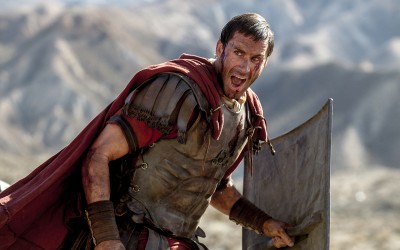
The death and resurrection of Jesus Christ is a story that has been told and retold throughout the ages. The narrative has been remade countless times in both story and film, yet no story has been so daring in telling it like “Risen.”
Seen through the eyes of fictional Roman military tribune Clavius (Joseph Fiennes), the movie begins as a seemingly nonreligious account of Jesus’ crucifixion. From the perspective of the violent and power-hungry Romans, Jesus is seen as many things — a threat to Roman rule and a reason for potential uprising in Jerusalem, but certainly not as the Messiah.
After Jesus’ crucifixion, Clavius is ordered by Roman prefect Pontius Pilate (Peter Firth) to ensure that Jesus’s body is locked away from the reach of his mourning followers. Yet even with a massive boulder, impenetrable ropes, hardened wax and two Roman guards keeping the body in the tomb, the following day, it is inexplicably gone.
From this moment, the story kicks in with full suspense as Clavius races against time to find the body before it is rotten and unrecognizable. Though he was publicly crucified, Jesus’ corpse is still needed as evidence to disprove that he is the Messiah. However, the relentless search digging through graveyards and interrogating Jesus’ followers only leaves Clavius with more questions than answers.
Though he initially disbelieves the insistence that Jesus has risen, Clavius slowly realizes that he is dealing with something much larger than himself as the clues start to stack against him. Suddenly, the story becomes less about the pursuit of Jesus’ body and more about a man’s firm disbelief being challenged by the exact faith that his people ridiculed.
Irony is used heavily throughout the plot as this Roman tribune, who is violent simply by Roman nature, begins seeing truth in a faith that advocates peace and acceptance of others. Even more ironically, Clavius prays to Mars, god of war, while on his mission to find Jesus’ body, further showing the distinct set of values between the Roman and Jewish people.
The theme of power is also shown as an important aspect of Roman life — Clavius answers to Pilate who ranks over him, and Pilate answers to the emperor. The fight to maintain power is also the reason Clavius is sent on this manhunt for Jesus’ body, for the idea of a supposed Messiah is a threat to Roman rule.
The film itself is both a religious and nonreligious account of the resurrection story, as it portrays a classic Biblical narrative but without evangelical bias. In addition to the biblical figures who appear in the film, such as Mary Magdalene (María Botto) and the 12 Apostles, several other fictional characters help to set the scene historically.
While having prior biblical knowledge was certainly helpful in recognizing details and important figures of the story, it was not completely necessary to understand the general plot and message.
Director Kevin Reynolds sets the tone of the two rival groups by showing the Romans as hostile through bloody, merciless battles against the Jews. Little is withheld as the camera shows the Romans ruthlessly breaking the legs of the other two men crucified. Bloodshed is a large part of the film and though it might deter some viewers, the lack of censorship is crucial in portraying the story with accuracy.
In contrast to the Romans, the Jews are initially portrayed as ignorant people crazed by the idea of the Messiah and are not taken seriously by Clavius, who thinks they are deranged for believing in claims of the resurrection. However, as Clavius realizes that they are right about Jesus, the Apostles are no longer portrayed as naïve and instead are shown as accepting and loving in a way he does not understand.
Like an abused dog afraid of a loving hand, Clavius is untrusting of the warm and welcoming Apostles. Fiennes brilliantly portrays Clavius as a man who is visibly conflicted by this challenge to his prior beliefs. As a Roman, he is accustomed to merciless violence and harsh consequences, but this all changes when he finally submits to Jesus’s loving embrace.
While the ending is a bit expected and becomes more obvious as the movie progresses, the final message is not cheapened by the film’s evident outcome. Clavius’ drastic transformation from skeptical, power-hungry tribune to accepting believer of Jesus poses a powerful message that even nonreligious viewers can appreciate.
Ultimately, the film is successful in illustrating a revered biblical account in a way that offers more than just religious significance. While some may find the blood and gore to be a deal breaker, “Risen” effectively recreates the resurrection in a way that is true yet enlightening in its final message.




